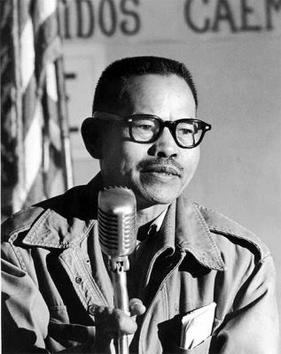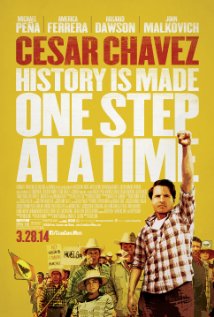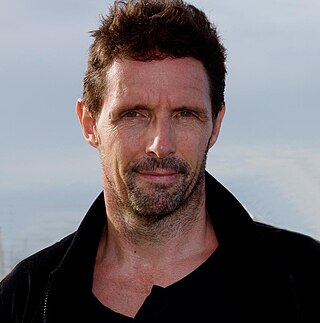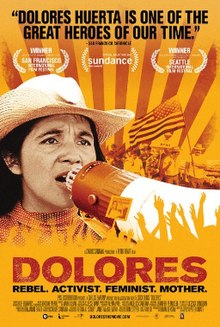
Cesario Estrada Chavez was an American labor leader and civil rights activist. Along with Dolores Huerta, he co-founded the National Farm Workers Association (NFWA), which later merged with the Agricultural Workers Organizing Committee (AWOC) to become the United Farm Workers (UFW) labor union. Ideologically, his worldview combined leftist politics with Catholic social teachings.

The United Farm Workers of America, or more commonly just United Farm Workers (UFW), is a labor union for farmworkers in the United States. It originated from the merger of two workers' rights organizations, the National Farm Workers Association (NFWA) led by César Chávez and Dolores Huerta and the Agricultural Workers Organizing Committee (AWOC) led by organizer Larry Itliong. They allied and transformed from workers' rights organizations into a union as a result of a series of strikes in 1965, when the Filipino American and Mexican American farmworkers of the AWOC in Delano, California, initiated a grape strike, and the NFWA went on strike in support. As a result of the commonality in goals and methods, the NFWA and the AWOC formed the United Farm Workers Organizing Committee on August 22, 1966. This organization was accepted into the AFL–CIO in 1972 and changed its name to the United Farm Workers Union.

Dolores Clara Fernández Huerta is an American labor leader and civil rights activist who, with Cesar Chavez, is a co-founder of the United Farmworkers Association, which later merged with the Agricultural Workers Organizing Committee to become the United Farm Workers (UFW). Huerta helped organize the Delano grape strike in 1965 in California and was the lead negotiator in the workers' contract that was created after the strike.

Philip Villamin Vera Cruz was a Filipino American labor leader and farmworker. He helped found the Agricultural Workers Organizing Committee (AWOC), which later merged with the National Farm Workers Association (NFWA) to become the United Farm Workers (UFW). As the union's long-time second vice president, he worked to improve the working conditions of migrant workers.

"Sí, se puede" is the motto of the United Farm Workers of America, and has since been taken up by other activist groups. UFW co-founder Dolores Huerta created the phrase in 1972 during César Chávez's 25-day fast in Phoenix, Arizona. "Sí se puede" has long been a UFW guiding principle that has inspired the accomplishment of goals. The phrase is a federally registered trademark of the UFW. It has been widely adopted by other labor unions and civil rights organizations, and drew widespread political and media attention as a rallying cry during the U.S. immigration reform protests.

The Delano grape strike was a labor strike organized by the Agricultural Workers Organizing Committee (AWOC), a predominantly Filipino and AFL-CIO-sponsored labor organization, against table grape growers in Delano, California to fight against the exploitation of farm workers. The strike began on September 8, 1965, and one week later, the predominantly Mexican National Farmworkers Association (NFWA) joined the cause. In August 1966, the AWOC and the NFWA merged to create the United Farm Workers (UFW) Organizing Committee.

Eliseo Vasquez Medina is a Mexican-American labor union activist and leader, and advocate for immigration reform in the United States. From 1973 to 1978, he was a board member of the United Farm Workers. He is currently secretary-treasurer of the Service Employees International Union. He was previously an international executive vice president, the first Mexican American to serve on the union's executive board. Medina announced his resignation as an SEIU executive vice president effective October 1, 2013.

Cesar Chavez Day is a U.S. federal commemorative holiday, proclaimed by President Barack Obama in 2014. The holiday celebrates the birth and legacy of the civil rights and labor movement activist Cesar Chavez on March 31 every year.
Fred Ross was an American community organizer. He founded the Community Service Organization (CSO) in 1948, which, with the support of the Industrial Areas Foundation, organized Mexican Americans in California. The CSO in San Jose, CA gave a young Cesar Chavez his first training in organizing, which he would later use in founding the United Farm Workers. Ross also trained the young Dolores Huerta in community organizing.
George "Elfie" Ballis was an American photographer and activist who advocated on behalf of migrant farm workers in California, and took tens of thousands of photographs documenting the efforts of César Chávez, the Mexican American labor leader who founded the United Farm Workers.

Richard Estrada Chavez was an American labor leader, organizer and activist. Chavez was the younger brother of labor leader César Chávez, who co-founded the National Farm Workers Association, now known as the United Farm Workers (UFW). Richard Chavez is credited with building the UFW into a major California agricultural and political organization.
Helen Fabela Chávez was an American labor activist for the United Farm Workers of America (UFWA). Aside from her affiliation with the UFW, she was a Chicana with a traditional upbringing and limited education. She was also the wife of César Chávez.

Modesto "Larry" Dulay Itliong, also known as "Seven Fingers", was a Filipino-American union organizer. He organized West Coast agricultural workers starting in the 1930s, and rose to national prominence in 1965, when he, Philip Vera Cruz, Benjamin Gines and Pete Velasco, walked off the farms of area table-grape growers, demanding wages equal to the federal minimum wage, that became known as the Delano grape strike. He has been described as "one of the fathers of the West Coast labor movement."

Cesar Chavez is a 2014 biographical film produced and directed by Diego Luna about the life of American labor leader Cesar Chavez, who cofounded the United Farm Workers. The film stars Michael Peña as Chavez. John Malkovich co-stars as the owner of a large industrial grape farm who leads the opposition to Chavez's organizing efforts. It premiered in the Berlinale Special Galas section of the 64th Berlin International Film Festival.
Barbara Carrasco is a Chicana artist, activist, painter and muralist. She lives and works in Los Angeles. Her work critiques dominant cultural stereotypes involving socioeconomics, race, gender and sexuality, and she is considered to be a radical feminist. Her art has been exhibited nationally and internationally. Her work was exhibited in the 1990-1993 traveling exhibition Chicano Art: Resistance and Affirmation.

Niall McKay is an Irish writer, Emmy-winning director and film curator. He’s the writer/director of a New York based comedy series called On the Lig, a shorts programmer for the Tribeca Film Festival and curator of Irish Screen America, an Irish film festival held at USC in Los Angeles and NYU in New York. McKay is also co-founder of the production company Media Factory.
Maria Moreno was an American farmworker and labor organizer. She was the first woman farmworker hired to be a union representative.
Gilbert Padilla is an American labor leader and civil rights activist who, along with Cesar Chavez and Dolores Huerta, co-founded the National Farm Workers Association (NWFA), which later became the United Farm Workers of America (UFW). In his position as Chavez's right-hand man, he served as vice president of the NWFA and then secretary-treasurer in the UFW. He helped to build the UFW through organizing union membership drives, boycotts, and strikes. In 1965, Padilla was the center of the rent strike in Tulare County. He and Jim Drake challenged the California state government for a sudden rent hike in labor camps where the buildings were long past their demolition date; it helped garner attention for the grape strike later in the year.
Marion Theresa Moses was an American physician, nurse, and labor activist, closely associated with Cesar Chavez.

Fred Ross Jr. was a labor and political organizer in California, working closely with the United Farm Workers (UFW) and other progressive causes.













